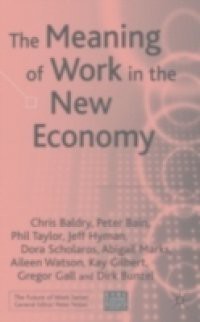Towards the end of the century many grandiose assertions were made about changes in the workplace and what these implied for the role of work in our lives. Many of these were incorporated into the idea of the 'knowledge economy' in which working with the new technologies was supposed to be more intrinsically satisfying, knowledge workers displayed higher levels of commitment and work in general was becoming a 'central life interest'. This book critically investigates the evidence for such trends by taking two new and expanding information-intensive employment sectors - call centres and software development.Through observation, survey and interview data from nine case studies, the book records, analyses and tries to understand the multiple levels of meaning which people attach to work today. It records not only the changes to the contemporary workplace but also the continuities with the past. Work today is the same mixture of satisfaction and unpleasantness as it has always been, but the contemporary workplace is perhaps a more unstable environment than we have been used to for some time.

